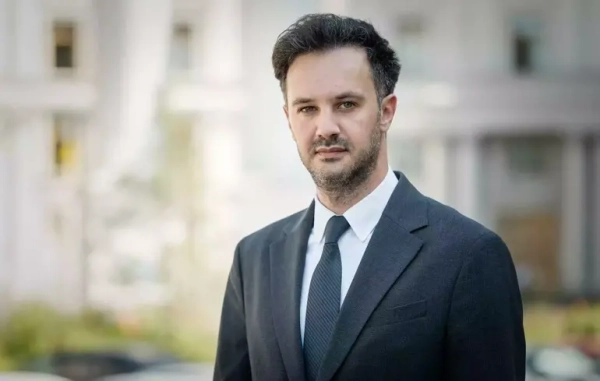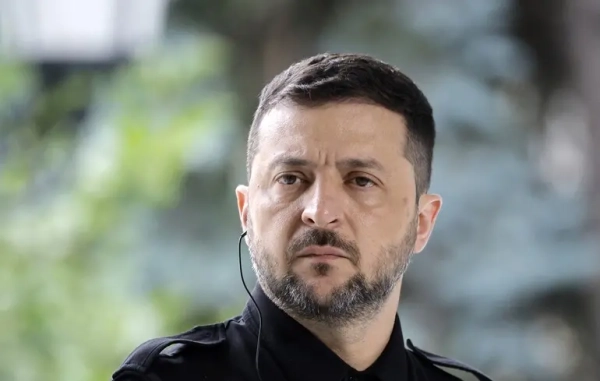The House select committee's 18-month-long investigation into the Capitol attack on Jan. 6, 2021, came to a dramatic close Monday when members voted unanimously to make multiple criminal referrals to the Justice Department over former President Donald Trump's efforts to overturn the 2020 election.
In a sweeping 160-page summary released after the meeting to explain its findings, the committee labeled Trump as the "central cause" of the attack and listed four charges they recommended be brought against him.
The Justice Department is not obligated to act on such referrals to charge Trump, or even to acknowledge them. But the public hearings outlining Trump's "multi-part scheme" to overturn the 2020 presidential election have amped up pressure on Attorney General Merrick Garland to bring criminal charges against Trump — which would be the first in history against a former president.
"We have every confidence that the work of this committee will help provide a roadmap to justice and that the agencies and institutions responsible for ensuring justice under law will use the information we provided to aid in their work," Chairman Bennie Thompson, D-Miss., said in his opening statement.
MORE: Jan. 6 committee condemns Trump as 'central cause' of insurrection in sweeping report
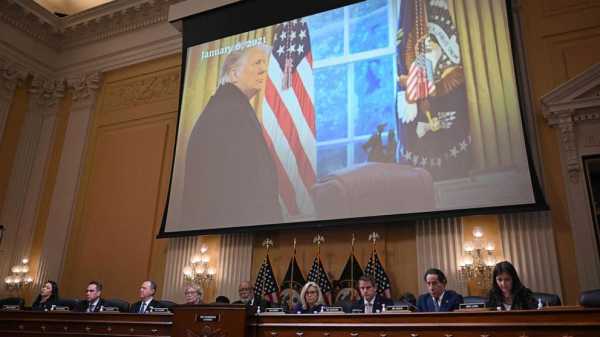
House Select Committee to Investigate the January 6 Attack on the U.S. Capitol holds its last public hearing, December 19, 2022 in Washington, DC.Mandel Ngan/AFP via Getty Images
Anticipating critics will deem any committee action as political, members emphasized how the referrals, while historic, follow the first time in history an American president refused a peaceful transfer of power.
"We understand the gravity of each and every referral we are making today, just as we understand the magnitude of the crime against democracy that we describe in our report," said Rep. Jamie Raskin, D-Md. "But we have gone where the facts in the law lead us, and inescapably, they lead us here."
Here are some key takeaways from the final business meeting:
Committee refers Trump to DOJ on 4 criminal charges
After the committee's nine members took turns describing what they said they uncovered in hours of interviews and thousands of documents, Raskin was the one to announce that the evidence "warrants a criminal referral, of former president Donald J. Trump, John Eastman and others."
He listed four federal criminal statutes Trump and others allegedly violated: Obstruction of an Official Proceeding (18 U.S.C. § 1512(c)), conspiracy to defraud the United States (18 U.S.C. § 371), conspiracy to make a false statement (18 U.S.C. §§ 371, 1001) and to "incite," "assist" or "aid and comfort" an insurrection (18 U.S.C. § 2383).
"We propose to the committee advancing referrals where the gravity of the specific offense, the severity of its actual harm and the centrality of the offender to the overall design of the unlawful scheme to the overall election compel to us speak," Raskin said. "Ours is not a system of justice where foot soldiers go to jail and the masterminds and ringleaders get a free pass."
Raskin pointedly said that "the starting point" of the committee's analysis was how a federal judge in March already found Trump's and Eastman's pressure on then-Vice President Mike Pence to obstruct the congressional count of electoral votes "more likely than not" violated two of the statutes: obstruction of an official proceeding and conspiracy to defraud the United States.
ABC News Chief Legal Analyst Dan Abrams, after the committee acted, said he would argue that Justice Department investigators doesn't really want to deal with the criminal referrals "in an effort to remain apolitical."
"They're not going to take the legal conclusions of the committee and run with it," Abrams said. "From their [the DOJ] perspective, if they were deciding, they might have said, 'Don't refer anything to us, please. You guys do your thing, we're going to do our thing. We don't want anyone to claim that the two are intertwined.'"
Highlight reel of Jan. 6 hearings
For Americans who might have missed some of the committee's previous work, members played a montage of highlights from previous hearings and closed-door videotaped depositions to hammer home their findings that Trump was told he lost the election but pushed forward with an attempt to remain in power anyway.
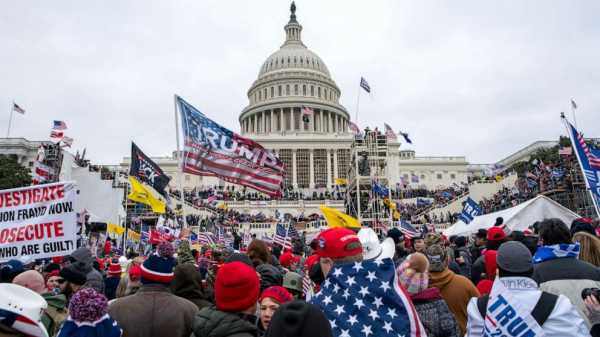
Supporters of President Donald Trump rally at the U.S. Capitol, Jan. 6, 2021, in Washington.Jose Luis Magana/AP Photo, File
That included a deposition from former Attorney General Bill Barr, who told the committee that he thought Trump's claims of fraud were "bull****." Also featured was deposition from former White House counsel Pat Cipollone, who told the committee he described Trump's last-ditch plan to install a loyalist to be acting attorney general as a "murder-suicide pact."
MORE: What we've learned from the Jan. 6 committee hearings
Moments from Cassidy Hutchinson's bombshell testimony were also played, including her comments about Trump's desire to go to the Capitol on Jan. 6.
Footage of rioters breaching the Capitol obtained by the the committee was aired, along with photographs showing then-Vice President Mike Pence sheltering-in-place in the Capitol complex as the violence unfolded.
Cheney deems Trump 'unfit for office'
Co-chair Rep. Liz Cheney focused on how Trump was the first president in American history to refuse a peaceful transfer of power and was blunt in belief that he should never be allowed to hold office again.
"January 6, 2021, was the first time one American president refused his constitutional duty to transfer power peacefully to the next," she said in her opening remarks. "In our work over the last 18 months, the select committee has recognized our obligation to do everything we can to ensure this never happens again."
Cheney said among the most "shameful" of the committee's findings was that Trump sat in the dining room off the Oval Office watching the Capitol attack on television and resisted for hours issuing a public statement instructing his supporters to go home, despite urgent pleas from White House staff and lawmakers.
"During this time, law enforcement agents were attacked and seriously injured. The Capitol was invaded. The electoral count was halted, and the lives of those in the Capitol were put at risk," Cheney said. "In addition to being unlawful, as described in our report, this was an utter moral failure and a clear dereliction of duty."
"No man who would behave that way at that moment in time can ever serve in any position of authority in our nation again," she added. "He is unfit for any office."
4 Republicans referred for ethics violations
The committee is also referring multiple House Republicans to the House Ethics Committee over failure to comply with lawful subpoenas.
Those lawmakers are top House Republican Kevin McCarthy and Reps. Jim Jordan, Scott Perry and Andy Biggs.
"We asked multiple members of Congress to speak with us about issues critical to our understanding of this attack on the 2020 election, and our system of constitutional democracy. None agreed to provide that essential information," Democratic Rep. Raskin said during the meeting.
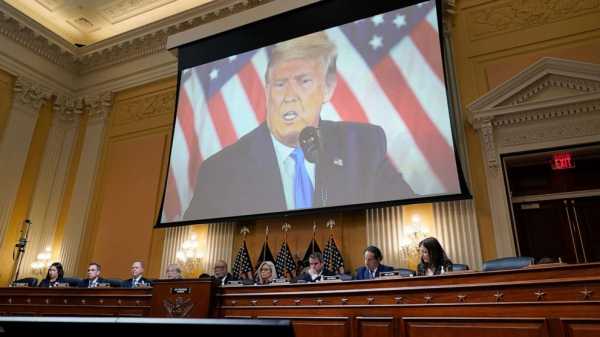
A video of former President Donald Trump is shown on a screen, as the House select committee investigating the Jan. 6 attack on the U.S. Capitol holds its final meeting on Capitol Hill in Washington, Dec. 19, 2022.J. Scott Applewhite/AP
"As a result, we took the significant step of issuing them subpoenas based on the volume of information particular members possessed about one or more parts of President Trump's plans to overturn the election. None of the subpoenaed members complied," Raskin continued.
There were a total five members who did not comply with their subpoena requests from the committee, the final being Rep. Mo Brooks. Brooks, who is leaving Congress, was not included in the list of referrals in the House Jan. 6 committee's executive report.
But with Republicans taking control of the House and its committees in a matter of weeks, it's unlikely the referrals will go far.
What's next?
While this was the committee's last big stand, a more comprehensive report of its findings and recommendations is due out on Wednesday.
"This committee is nearing the end of its work, but as a country we remain in strange and uncharted waters," Thompson said. "We've never had a president of the United States stir up a violent attempt to block the transfer of power. I believe, nearly two years later, this is still a time of reflection and reckoning."
"If we are to survive as a nation of laws and democracy, this can never happen again," he added.
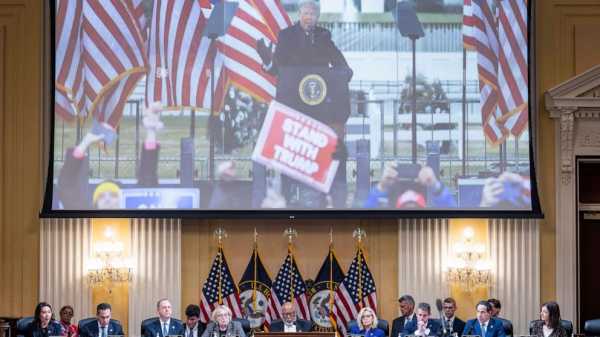
An image of former President Donald Trump is displayed as members of the House Select Committee to Investigate the January 6 Attack on the U.S. Capitol hold its last public hearing in the Canon House Office Building on Capitol Hill, Dec. 19, 2022 in Washington, DC.Jim Lo Scalzo/Getty Images
While the congressional committee disbanding at the end of the year, the Justice Department's investigation into what happened on Jan. 6 will continue.
The department has separately conducted its own investigation for months, but it has not had access to the committee's expansive evidence until this week.
MORE: Jan. 6 committee refers Trump to DOJ for criminal charges
While skeptical of the impact of the committee's criminal referrals to DOJ, Abrams said the Jan. 6 committee's work could be valuable going forward in what it documented via testimony and other materials from those around Trump and the Capitol rioters.
"So the referral aspect of this, I think, is much less significant than what the evidence has uncovered and the fact that now the special counsel seems to be moving so quickly," he said.
Sourse: abcnews.go.com
